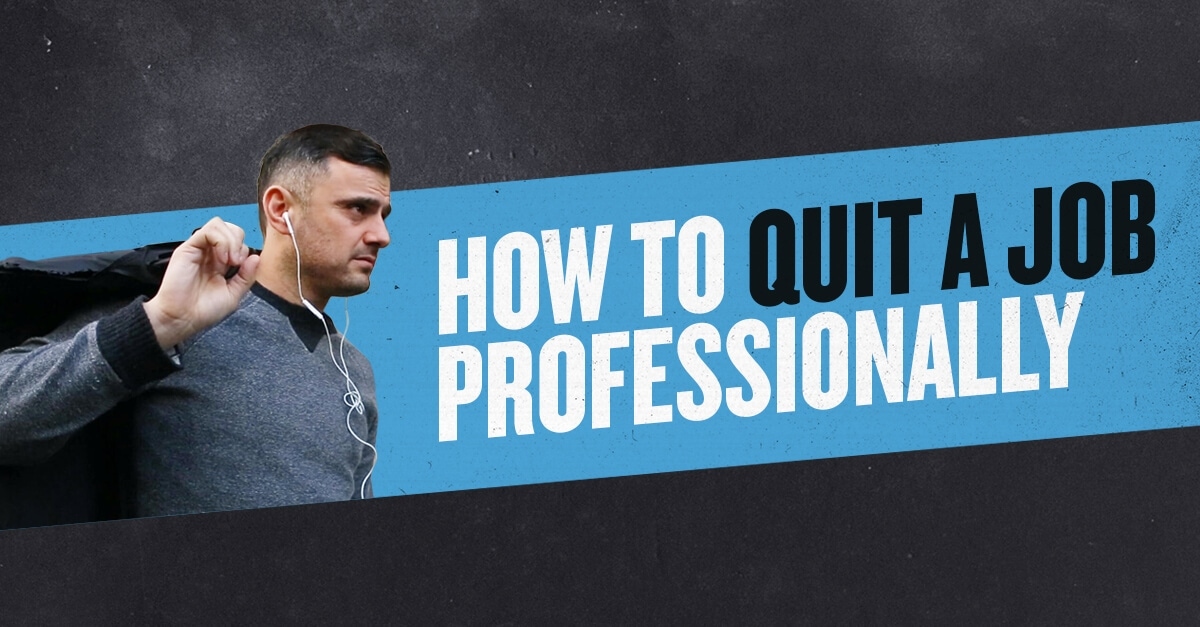People say “winners never quit and quitters never win.” Actually, I think there’s a great argument for quitting the shit you’re not good at, or the shit you just downright hate. For many people, it’s their boring, unexciting, dead-end job. This is not me bashing 9-to-5 jobs. In fact, I think they get a bad rep.
If you’ve found a place that you love going to every day where the culture is exciting, the people are warm and welcoming, and you have a great work-life balance, you’ve struck gold. That’s exactly what I’m working to build within VaynerMedia. If that isn’t the case, however, you need to ask yourself why you’re staying in a situation where you’re unhappy and give yourself permission to quit.
Quitting is only taboo because people have their priorities screwed up. Too many people think they can’t quit only because they need their job to pay for dumb stuff to impress people they don’t even like. When you stop living based on other people’s opinions, you start to see that quitting can actually be a strategic move. Worst case scenario, you disappoint some people or you regret your decision. The good news is you can always get another job. Stop looking for permission from mom, dad, your partner, society, or people on social media and go live the life you want. If it means less money now for more happiness later, so be it. Why are you not willing to take one step backwards to take a step forward for the rest of your life? 🤔

That being said, quitting isn’t always the answer. Before you make a rash decision, do a self-accountability check and ask yourself how you might be contributing to your own unhappiness at your job. Unfortunately, a lot of people are non-confrontational and end up leaving jobs without first trying to find a resolution. If you don’t communicate your dissatisfaction with kind candor, you miss potential opportunities for the organization to address your concerns.
I urge you to think it through seriously and take a practical look at the realities of leaving your job. If you quit, be prepared to work and understand that things typically get a lot harder before they get better. Quitting your job is your decision, which means no one else should suffer the consequences besides you — aka, don’t expect mom and dad to fund your life. You might need to downgrade your lifestyle and get happy living on less. Many people romanticize the idea of quitting, but in reality, they lack the humility to go backwards financially.
I’m not here to convince you one way or the other, but if you decide to quit, I want you to be as prepared as possible. If you’ve weighed your options and decided to leave, here’s my advice on how to go about quitting your job professionally.
WHEN TO QUIT YOUR JOB
Everyone gets stressed about work sometimes, but how do you know when it’s truly time to quit? In my opinion, it’s always a good idea to quit your job when you are genuinely unhappy. If you’ve gone months where you’re dreading going into work every day, that means something’s not right. Sustained unhappiness is not something to accept or endure — you don’t win any prizes for making yourself miserable. You only get one life!
Consider what you’re really giving up by staying in that job — your time, your energy, and your life. Each of these is a much more valuable asset than money. Of course, I understand that people have bills and responsibilities; I’m not arguing that money isn’t important. However, there are too many people keeping terrible jobs just so they can drive a luxury car, have a designer wardrobe, or take a first-class trip. The truth is, none of that is worth trading the chance to be truly fulfilled. Money is never a good enough reason to hate your life Monday through Friday.
On the flip side, you should definitely not quit your job just because you think the grass is greener on the other side. Many people turn to entrepreneurship and fall into the trap where they arbitrarily decide that they’re awesome, only to later find out that the market doesn’t value them the way they value themselves. Now that society has made entrepreneurs cool, many people are vastly underestimating how hard it is to work for yourself. The truth is, it’s easy to quit your job and start a business, but it’s super difficult to actually be good enough to be successful and scale.
I’ll let you in on a secret: the world plays in the middle, but all the action is in the edges. In other words, successful entrepreneurs operate in the extremes. They work longer hours, take more risks, and swallow more failures than your average person is willing to go through. Step one of quitting is having the self-awareness to know whether entrepreneurship is really your calling or just a sexy daydream.
TIMING
When it comes to timing, you have two options:
- Wait until you’re in a stable enough situation for your own life.
- Leave your job and live way more humbly (aka, get roommates or move back home).
Ultimately, it’s up to you — take whichever lane feels right. For some, that means preparing and saving enough money to live comfortably. For others, it means jumping and finding your parachute on the way down. If you absolutely can’t stand to stay any longer, be prepared to move to a smaller apartment or move back in with mom and dad. Remember, there’s no shame in downsizing or taking a strategic step backwards. It’s all about prioritizing.
GIVING NOTICE
Even if you hate your job, you should always give advance notice — and make sure your boss is the first person to hear about it. People will often break the news to friends and coworkers first. If you do this, you run the risk of it circulating through the grapevine and pissing off your higher-ups. Skip the drama and make sure your boss and HR are the first to know. The standard practice is two weeks’ notice at minimum, but it’s generally good practice to give a few weeks or even months’ notice if you are in a particularly vital role.
HOW TO TELL YOUR BOSS YOU’RE QUITTING
Telling your boss that you’re leaving the company is uncomfortable, but it’s a conversation that should be managed head-on. Whatever your reason is — it’s not a good fit, you’ve decided to switch careers, you’re interested in other opportunities — be upfront but gracious. I strongly recommend having a face to face meeting if possible. This is less about being respectful or cordial to your boss, and more about potential opportunity for you. Over the years, I’ve seen that people who resign in person are more likely to receive counter offers on the spot. Sometimes, that in-person interaction leads to a little more money or a show of compassion that you wouldn’t have gotten otherwise, and it may even cause you to reconsider. You never know.
If, however, an in-person meeting isn’t an option, email is more than fine. Send an official resignation letter to your boss and/or the head of the HR department. The key thing to note is it’s important to be clear but kind. State your resignation and list your last date of work, but also express gratitude for the opportunity. Even if it sucked, it at least taught you what you don’t want out of life — be grateful for that! If you’re asked to do an exit interview, this is your time to give constructive feedback. Best case scenario, the company will consider your input and rethink their operations or culture to make things better for the next hire.
WRAP UP AND SMOOTH TRANSITIONING
Finally, it’s always a good idea to use your final days to create a smooth transition, both for yourself and for the person stepping into your role. Save and clear any necessary documents off of your work devices, set up farewell coffee dates with your favorite coworkers, and tie up any loose ends on projects you’ve worked on. Offer to train your replacement, and consider compiling a resource guide to help them through the onboarding process. This will not only help that person, but it will make the process easier for your co-workers who may have to take on your duties until a new hire is brought on.
Ultimately, your life is up to you. I can’t tell you whether it’s right or wrong to quit your job, but if you’re reading this blog, I think you might already have your answer. 😉
Thank you for reading! If you got any value from this article, I would love it if you would share it on your favorite platforms!












Each paragraph was packed with valuable information, thank you.
This was such a refreshing read, I enjoyed every bit of it
I can tell you really care about your readers.
This was both helpful and inspiring. Thanks!
This was such a refreshing take on the topic.
You make a strong case here, and I appreciate your thoughtful reasoning.
Thank you for taking the time to write this up.
You’ve made a big difference in how I understand this now.
I felt more confident about this topic after reading your post.
Every time I read your posts, I walk away inspired.
Your blog always adds value—thank you for being consistent.
The tone of this article is warm and welcoming
I appreciate the thoughtful examples you provided; they made the content really relatable.
I’ve been struggling with this, and your post gave me clarity.
You’ve clearly done your research. This was a valuable read.
The historical context you provided enriched the discussion significantly.
This platform feels like a safe space for learning and growth.
Your tips are super practical and easy to follow—love it!
You explained this perfectly—thank you!
This blog always adds value to my day.
This was well worth the read—thank you!
You’ve added real value to my day with this.
This is one of the best explanations I’ve come across.
This topic was covered so thoroughly—great job.
I feel more confident tackling this now.
I can’t believe I didn’t know this sooner. So useful.
Your writing style makes complex topics easy to understand.
So many practical takeaways—I’m definitely trying these out.
I’m always impressed by the depth of your content.
Your writing style is so pleasant and approachable.
So well structured – everything flowed perfectly.
This answered all the questions I had — great job.
Your insights always bring a fresh perspective—thanks for sharing!
Great job simplifying a topic that usually feels so complicated.